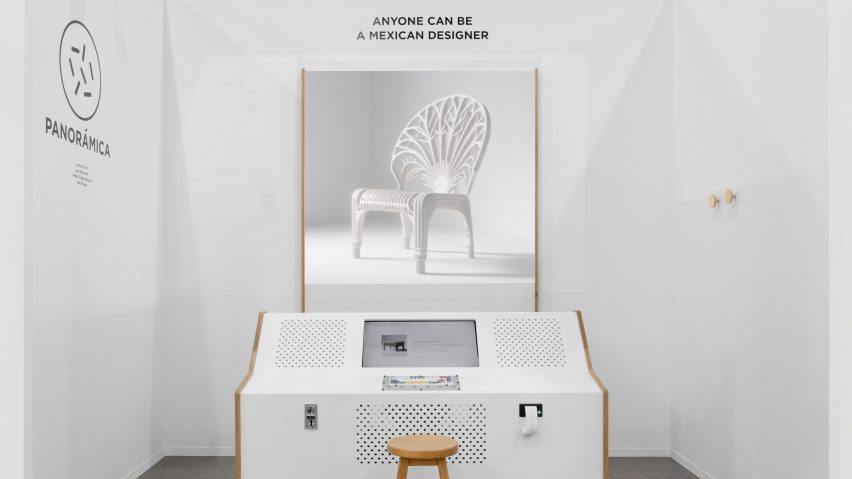Design collective Panorámica has created a machine that utilises artificial intelligence and a set of prompts to generate unique pieces of furniture based on a repository of Mexican design styles during Mexico City art week.
Showcased at the design section of the Zona Maco art fair in Mexico City, the exhibition was called Anybody Can Be a Mexican Designer with a subheading that disclaimed "even if you are not a designer nor Mexican".
The exhibition showcased the collective's machine inside a white booth backed by a massive screen.
The machine itself is a large, white wood-trimmed box with a small screen, a coin-insertion slot and a ticket printer. Panorámica said that the look of the machine itself was influenced by the minimalist modernism practised by the German Ulm School of design in the mid-20th century.
After inserting a 10-peso coin ($0.59), users were guided through a sequence of prompts including typology, periods in Mexico's history – from the Neolithic to the contemporary – as well as variations in colour and degrees of decoration.
The machine has a reference bank with an archive of images drawn from a "wide spectrum of what we commonly imagine about design in Mexico," according to the collective. The software involved included a mix of Arduino, TouchDesigner and the OpenAI artificial intelligence application programming interface (AIAPI).
The combination of prompts was the processed with an image of the resulting piece of furniture displayed on a screen.
The collective called the machine a "living provocation", asking the users to reassess certain assumptions about cultural provenance, accreditation and machine-led creation.
"By replacing the human in certain aspects of the creative process, it forces us to rethink what we understand by creativity and authorship," said Panorámica.
"The machine challenges the traditional notion that design is a purely human domain, opening a dialogue about the role of technology in the evolution of design," it continued.
"It confronts us with the possibility that authenticity in design does not lie in mere adherence to aesthetics, references, and recognizable styles, but in the constant search for genuine and meaningful expressions."
The studio also noted that the machine was meant to challenge fixed notions of the identity of Mexican design itself.
Panorámica believes it is a marker of the "turning point" that machine-learning-based image generation software represents for design and creativity in general.
"Mexican design, as we know it, is revealed not as a fixed entity, but as a constantly changing formula, susceptible to being redefined and expanded, not only within the borders of Mexico but on the global stage," said the collective.
"This machine is not just a tool, but a powerful symbol of a new dawn in design and creativity, comparable to the introduction of the steam engine in the industrial revolution or the adoption of CAD technologies in the modernization of the design process."
For more on how AI might affect the world of design, see the AItopia editorial series that Dezeen ran last year.
Panorámica was founded by designers José de la O, Ian Ortega, Jorge Diego Etienne, and Joel Escalona. Its past work ranges from more traditional design objects to exhibitions examining materiality in the Mexican context.
Other exhibitions that took place during Mexico City art week 2024 include an installation where Guadalajara-based studio Bolsón transformed a storefront with upcycled plastic upholstery.
The photography is by Achach Fotografía.
Zona Maco took place in Mexico City from 7 to 11 February 2024. For more events, exhibitions and talks in architecture and design visit Dezeen Events Guide.

